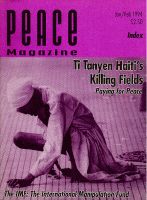
Peace Magazine Jan-Feb 1994, page 19. Some rights reserved.
Search for other articles by Dietrich Fischer here
Last year, terrorist bombs exploded in dozens of cities around the world, including one in New York's World Trade Center. If any had been nuclear, hundreds of thousands of people would have been killed.
Deterrence, the traditional strategy seeking to prevent nuclear attacks through the threat of retaliation, is ineffective against terrorists. To prevent nuclear terrorism, we must keep nuclear weapons out of the hands of terrorists.
Preventing the spread of nuclear weapons requires global cooperation. If even a single country sells nuclear weapons to anyone who pays, this endangers the entire world. The more countries that possess nuclear weapons, the more likely it is that some may be sold or stolen. It is essential to renew the Nuclear Nonproliferation Treaty when it expires in 1995.
Last spring, President Clinton received thousands of letters and phone calls from ordinary Americans urging him not to resume U.S. nuclear weapons tests. He finally denied the request of the nuclear weapons research laboratories and the Pentagon to begin a new series of such tests. On July 3, 1993, he announced that the United States would extend its test moratorium for 15 months if no other country began new tests, and would seek early negotiations for a comprehensive nuclear test ban. Russia and France said they would not test as long as the United States maintained its moratorium. Great Britain, which depends on the Nevada test site, is bound by the U.S. moratorium. China interrupted an informal one-year moratorium with a nuclear test last fall, but other nuclear powers have not resumed their tests.
The nuclear weapons laboratories in all of these countries argue that periodic test are needed to check the reliability of existing weapons. But perfect reliability is not needed for deterrence. No opponent could assume that all of a country's nuclear weapons would definitely not work if they had not been tested recently. The real reason why nuclear weapons scientists want more test is to obtain continued funding.
A general resumption of nuclear tests would make it difficult to renew the Nonproliferation Treaty, and even harder to strengthen it. People throughout the world increasingly resent the double-standard of the nuclear powers, which insist that other countries refrain from developing nuclear weapons while they keep or even modernize their own arsenals. The U.S.-Russian nuclear arms reductions begun in 1987 must continue and include other nuclear powers.
Simply to renew the Nonproliferation Treaty in its present form is not sufficient, it must be strengthened. The International Atomic Energy Agency (IAEA) can now inspect only sites that member countries voluntarily place under its supervision. For example, the United States recently accepted North Korea's offer of a one-time inspection of seven declared nuclear sites, even though it refuses access to two nuclear waste sites that could reveal whether it has diverted plutonium to a nuclear weapons program. If a suspected drug smuggler could tell a border guard, "You may check under my seat and in the glove compartment, but don't open the trunk," such an "inspection" would be meaningless. The IAEA must have the power to inspect any suspected nuclear facilities, without advance warning, even in nonmember countries; otherwise it is impossible to prevent the spread of nuclear weapons.
Many governments might object to such intrusive inspections as a "violation of national sovereignty." But many airline passengers also protested first against having their luggage searched for guns or explosives, when that policy was introduced after a series of hijackings. Today, most realize that such inspections protect their security. Those who have nothing to hide have nothing to fear. Sooner or later, governments may reach the same conclusion. Will this happen before or after the first terrorist nuclear bomb explodes?
National sovereignty" is a false issue here, since no country today has sovereign control over the world's nuclear arsenals. By giving the IAEA effective authority to prevent the spread of nuclear weapons, we do not give up any control over our lives that we now possess, but gain added control that we could never achieve at the national level.
Ultimately, we must destroy all nuclear weapons. Some have argued that we cannot disinvent nuclear weapons and therefore will have to live wiith them as long as civilization exists. We may never forget how to make nuclear bombs, but this does not mean that we must keep them. Nobody has disinvented cannibalism either, yet we abhor it. Can't we learn to abhor equally the incineration of entire cities with nuclear weapons?
Dietrich Fischer, a professor at Pace University and board member of Economists Allied for Arms Reduction, is the author of Nonmilitary Aspects of Security.

Peace Magazine Jan-Feb 1994, page 19. Some rights reserved.
Search for other articles by Dietrich Fischer here